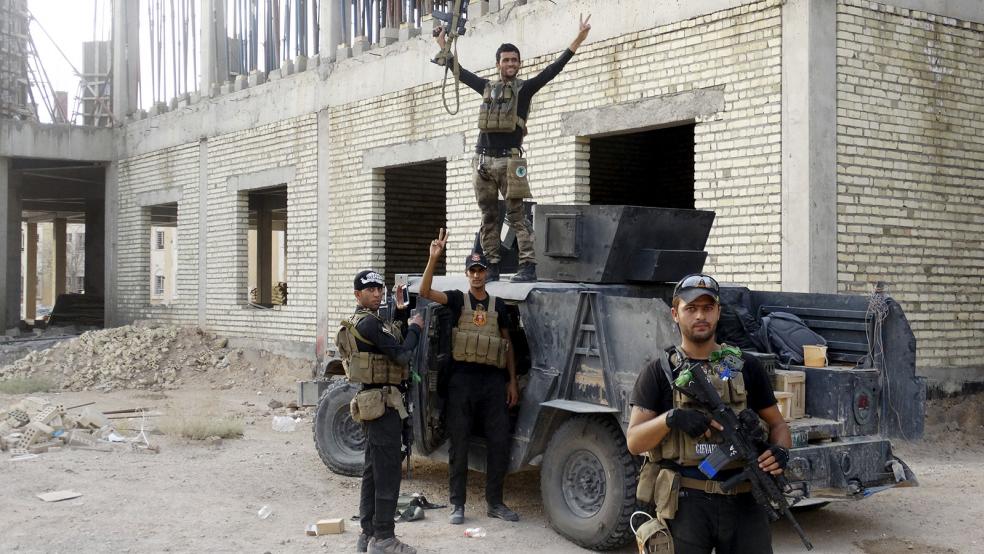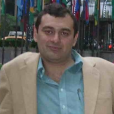When ISIS was defeated in Ramadi last month, the terror group that directed the Paris attacks and inspired the San Bernardino attack suffered a strategic blow. Ramadi, the capital of Anbar, Iraq's largest province where 1300 American soldiers and Marines were killed since the U.S. led invasion of Iraq in 2003, is the largest city ever recaptured from ISIS.
Along with the good news, however, comes bad information based on rumors and hearsay—typical sources in the Middle East, especially regarding ISIS. The stunning confusion between facts and fiction take on a life of their own, making the complex Middle East even harder to comprehend. Here’s where we stand in Ramadi as we begin 2016.
Related: Iraqi Army Declares First Major Victory Over Islamic State in Ramadi
Is the Battle for Ramadi Really Over? After Iraqi counter terrorism forces raised the Iraqi flag on the roof of the partly destroyed provincial government building last month and western media reported that Ramadi had been retaken by the Iraqi government, a state of joy circulated across Iraq. What followed was a renewed faith in the Iraqi army among Iraqis and foreigners alike.
Yet, the truth is more complicated.
Reliable sources among the Iraqi government and the U.S. military say that while it is true that ISIS has been driven out of the provincial government building, the city still has pockets of ISIS resistance that need to be cleared out.
Ramadi has more than forty neighborhoods. The government forces have retaken more than half of them, but there are still about 700 ISIS fighters still in the city, according to the U.S. military. This number might be exaggerated. Last Friday ISIS attacked multiple targets in Ramadi. The attacks were repelled after a fierce fight that left dozens of Iraqi soldiers dead and gave ISIS control--briefly--of the Iraqi army’s tenth division headquarters.
Who Gets the Credit for Victory? The phrase "Success has a thousand fathers," is appropriate when the battle of Ramadi has been seen as successful for many. Many Iraqis and foreigners praise the Iraqi army for achieving victory. The U.S. forces in Iraq claim that about 600 US led air raids made the victory possible. Iran credits the Shiite militias for the successful retake of the city. Iraqi Sunnis tend to overemphasize the role of about 4300 U.S. trained Sunni tribal fighters in the fight.
Related: Iraqi Troops Close In On Islamic State Redoubt In Ramadi
While U.S. forces helped Iraqis choose the path that led to the victory by encircling the ISIS controlled areas in Anbar, including the cities of Ramadi and Fallujah, the true heroes of the battle of Ramadi were Iraqi counter terrorism forces. They were the main groups that pushed into the city and engaged with ISIS's defensive lines.
The US led air raids took place over a five-month period, the same time needed to completely cut off ISIS's supply lines from the city. The raids allegedly destroyed 400 ISIS targets, including tactical units, snipers, shock forces and suicide attacking platoons, vehicles, control and command centers, guest houses, car bomb factories, and training camps. The entire campaign took seven months. 5000 US anti tank missiles were provided to the Iraqi government forces have helped Iraq destroy ISIS's armored car bombs before they reached their targets.
All the American military support was provided with the condition that Shiite militias be tasked in a secondary role of securing the Iraqi government forces' supply lines from all directions, in part to calm sectarian Sunni - Shiite tensions. The Iraqi army and police would liberate the northern parts of the city while Sunni tribal fighters would secure the areas the counter terrorism forces had already liberated from ISIS bombs and fighters.
The counter terrorism forces are the only faction of the Iraqi government forces that have proven reliable in the fight against ISIS in the last two years. They are well trained, equipped, and motivated. They were recently expanded to two divisions. Among the forces’ best achievements during the battle of Ramadi were the engineering units' ability to assemble bridges to mount attacks on ISIS. The counter terrorism forces also used US armored mine detection vehicles effectively. A specialized battalion in dealing with hostage crises was used to free hundreds of families trapped behind ISIS's lines who were used as human shields by ISIS.
Related: Iraq's Abadi Plants Flag in Ramadi to Mark Islamic State Defeat
Ironically, the counter terrorism forces were called "the dirty force" when they were working alongside the US special operation forces after the US led invasion in 2003. Today, they are Iraq's best chance to fight ISIS. Nevertheless, Nibras Kazimi, a fellow at Hudson Institute specializing in jihadi groups says these forces have been abused and deployed in many occasions as infantry forces. They are exhausted after two years of non-stop fighting. In Ramadi, no less than a full division of 10,000 Iraqi government forces and their allies fought against a force ten to fifteen times smaller of ISIS fighters.
Is This The Turning Point? How Weak Is ISIS After Ramadi?
There is no doubt that ISIS's defeat in Ramadi made the terror group weaker. ISIS has lost lately on other fronts as well. In December alone, ISIS lost a dozen senior leaders, including the governors of Kirkuk and Diyala, a top police commander, recruiters in Iraq and Syria, military commanders of Dijla and Kirkuk states, top health officials in Mosul and Anbar, financial and administrative officials in Mosul, and two of its most senior judges in Mosul.
Hisham al-Hashimi, the expert on ISIS at the Iraqi national security advisor's office says that hundreds of ISIS fighters were killed in Ramadi alone, including full units of suicide bombers and snipers. The Iraqi intelligence service has also arrested 40 ISIS operatives who are the terror group's main human assets in Baghdad, Diyala and the south provinces.
Hashimi adds that one of the reasons for ISIS’s defeat in Ramadi was its dependence on field commanders who are hated by the locals. Saad al-Obeidi, ISIS military commander in Ramadi, was a former army officer with a history of vengeance with locals. Six other ISIS security officials in the city shared a similar background.
Related: Iraqi Forces to Retake Mosul From Islamic State After Ramadi Secured
The relentless bombing of ISIS oil properties has taken a toll financially on the terror group. Mosul blogger Maouris Milton says that ISIS decreased its fighters’ salaries and that ISIS's police in Mosul are enforcing fines as punishment more than before to collect money. ISIS leader, Abu Bakr al-Baghdadi's recent speech acknowledged the loss of lands and the difficulties the group is facing.
Yet, ISIS is still able to fight and attack on multiple fronts. Friday's attacks in Ramadi were coordinated with an attack on a dam to the west of Samarra, north of Baghdad. ISIS's fallen leaders are steadily replaced along with their foot soldiers. Because ISIS’s financial resources are diversified, they can absorb a hit to their oil properties. Yet, Ramadi could be a turning point, if it is followed by multiple and coordinated attacks in both Iraq and Syria.
Does Iraq Finally Have A Strong Commander In Chief And A National Leader? Many analysts have noted that Ramadi's victory will strengthen the Iraqi Prime Minister Haider al-Abadi. Iraq's lack of a national leader who can unify the divided country was a major reason for its violent sectarian strife. It is true that Abadi’s posture is better after Ramadi, but those who expect much of him will be disappointed.
Abadi is a U.K. educated engineer with a reputation for indecision. His former colleague at the political bureau of the party Salim al-Hasani says that Abadi was chosen last year by the corrupt Iraqi political class for the premiership because he wouldn't endanger their interests. Last summer, Abadi was urged by tens of thousands of Iraqi demonstrators and by the most senior religious figure in Iraq, grand Ayatollah Ali al-Sistani, to launch a campaign against corruption. Yet, his dithering allowed little to be achieved.
Related: Islamic State Suffers Double Blow as Ramadi Falls, Leaders Killed
When he is forced to make a decision, Abadi tends to simplify challenges into a numbers game. Examples of this approach are numerous: taking 50,000 ghost soldiers off the Iraqi army payroll, decreasing the government's official body guards from two divisions by 90 percent, firing hundreds of generals, deputy ministers, advisors, ambassadors, ministers, deputy prime ministers and vice presidents. All these steps help in combating corruption, but they don't touch the real cause of the problem.
Abadi also is facing a difficult year with increasingly limited resources. Iraq's oil revenues are dropping and the government has received foreign loans to pay salaries of public servants. In a state of near-bankruptcy, the war against ISIS will suffer from lack of funding. There are 3.5 million displaced people due to ISIS who need urgent aid. The liberated cities of Tikrit and Ramadi require reconstruction. The Shiite militias are fighting for funding but neither Iraq nor Iran has any to spare. So, some of them are taking hostages as they did with the group of Qatari hunters in the desert or with hundreds of Sunni men fleeing Ramadi to Baghdad.
Is Mosul Next? Al-Abadi has assured Iraqis that the next battle will be the liberation of Mosul, but this battle will be an even heavier lift than Ramadi. In Anbar, the Iraqi government needs to retake the city of Fallujah and several other cities, including Hit and al-Qaim. In the north and in order to liberate Mosul in a similar way to that of Ramadi, the Iraqi government will need to liberate the Talafar to the west of Mosul and al-Shirqat and al-Qayara to the south of Mosul. Al-Hawija to the southeast of Mosul must be dealt with as well.
To conduct all these operations, Iraq needs more reliable forces than its elite counter terrorism forces. Some experts estimate the forces needed to liberate Mosul would be no fewer than 25,000. Ramadi could be a turning point that eventually leads to ISIS’s final defeat. But this process may take many months or even years.





